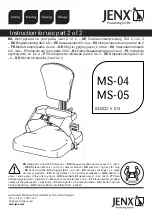
103688 Rev. A
25
Q U I C K I E P U L S E
X I . M A I N T E N A N C E
XI. MAINTENANCE
A. NOTES
1. Proper maintenance will improve performance and extend
the useful life of your chair.
2. Clean your chair regularly. This will help you find loose or
worn parts and will make your chair easier to use.
3. To protect your investment, have all major service and repair
work done by your supplier.
WARNING
1. Your chair needs regular maintenance for peak per-
formance and to avoid injury from chair failure, dam-
age or premature wear.
2. Inspect and maintain this chair strictly per the
“Maintenance Chart”.
3. If you detect a problem, make sure to service or repair
the chair before use.
4. At least once a year, have a complete safety check and
service of your chair performed by a supplier.
B. CLEANING
1. Plastic Shroud Cover:
• Clean the plastic finish with mild soapy water monthly.
2. Motors:
• Clean around motor area weekly with a slightly damp (not
wet) cloth.
• Wipe off or blow away any fluff, dust, or dirt on or around
the motors.
• Note: You do not need to grease or oil the chair.
3. Upholstery:
• Hand-wash only as needed. Machine washing may damage
fabric (rehab seat only).
• Drip-dry only. Heat from a dryer may damage fabric.
NOTE–
Washing the fabric may decrease fire retardant properties.
C. STORAGE TIPS
1. Store your chair in a clean, dry area. If you fail to do so, parts
may rust or corrode.
2. Before using your chair, make sure it is in proper working
order. Inspect and service all items on the “Maintenance
Chart”.
3. If you store this chair for more than three months, have it
inspected by a supplier before use.
D. BATTERY MAINTENANCE
WARNING
1. To prevent an acid spill, always keep batteries upright.
(wet cell batteries)
2. Never smoke or hold an open flame near batteries.
3. Always wear rubber gloves and safety glasses when you
handle batteries.
1. Maintenance Schedule:
This varies for different types of batteries. Always follow the
instructions supplied with your batteries.
NOTE–
Always wear rubber gloves and safety glasses when you handle or
service batteries.
2. Adding Water: (Wet Cells Only)
• Wet-type lead acid batteries need periodic replacement of
water lost.
NOTE–
Use distilled water only.
• Check the battery fluid level about once a week. When you
remove the stoppers (on top of the battery) there should be
one-eighth to one-quarter of an inch of fluid above the inter-
nal plates. Do not overfill.
3. Corrosion:
Check battery terminals often for corrosion.
a. If corrosion is present, use a wire brush to clean the terminals.
NOTE–
Always wear safety glasses and rubber gloves.
b. Use baking soda to neutralize acid.
c. Use petroleum jelly to re-grease the terminals after connect-
ing cables to battery. (Completely cover the terminal nut and
bolt, cable clip and any exposed cable with jelly).
4. For Answers To Questions: Contact your supplier.
E. TO REPAIR OR REPLACE A TIRE
WARNING
Residual air pressure in tires can cause severe injury.
Make sure you release all air in tire before attempting
to service or repair tires.
Drive Wheels:
a. Elevate and securely support chair so that wheel is off the
ground. Release all air from tire (solid aluminum rim only).
b. Remove center cap.
c. Remove four Allen bolts.
d. Remove wheel from chair.
e. Remove all bolts holding two halves of rim together (not appli-
cable on solid aluminum rim), and remove tire and solid insert.
f.
Repair or replace.
NOTE–
Do not use pneumatic inner tube in tires with two-piece rims.
g. Reassemble the wheel.
Use a torque setting of 420 in.-lbs. to re-tighten bolts.
h. Install wheel on chair by replacing center lock bolt. Use a
torque setting of 180 in.-lbs. to retighten bolts.
i.
Inflate tire to proper pressure level (listed on tire sidewall).
F. MOTOR BRUSHES
Check the motor brushes every four (4) months for wear. The
brushes should be clean and shiny. Replace worn or blackened
brushes.
G. ORDERING PARTS
When you order parts, provide the following:
1. Model of chair
2. Serial number of chair
3. Left hand or right hand control
4. Part number, description and quantity of parts you need.
5. State reason for replacement.




































